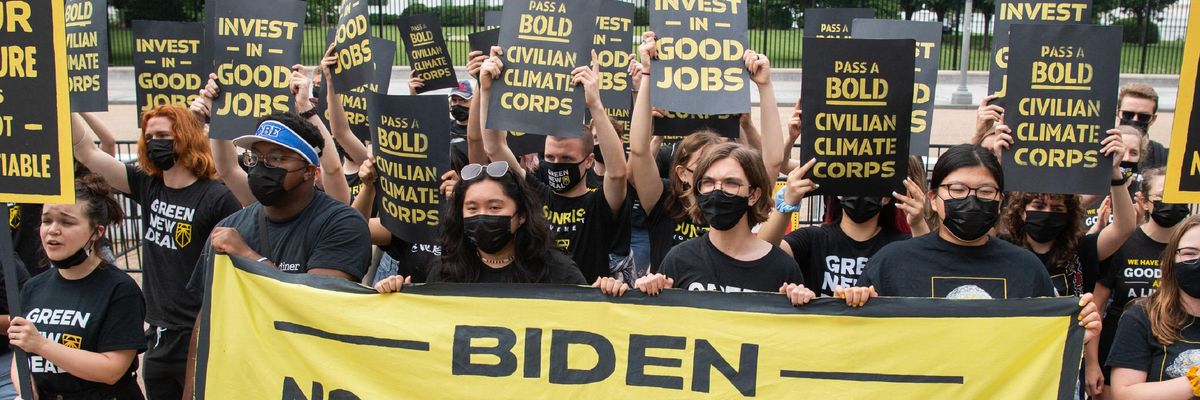After President Joe Biden ended fruitless infrastructure talks with leading Senate Republicans on Tuesday and shifted his focus to a separate bipartisan group working on a compromise proposal, the Congressional Progressive Caucus said the White House would be "foolish" to waste any more time pursuing GOP votes and demanded swift action on a package that includes major climate investments, child care, and other priorities.
"In case it wasn't clear already, it certainly is now: Republicans are not going to do what needs to be done for working families," Rep. Pramila Jayapal (D-Wash.), chair of the nearly 100-member CPC, said in a statement. "These are the same Republican senators who refused to vote for the American Rescue Plan even if some touted its benefits after voting no, who refused to pass a bipartisan commission to investigate the January 6 insurrection, and who refused to vote for pay equity."
"Further delays jeopardize momentum and allow Republicans to block progress for the American people with no end in sight."
--Rep. Pramila Jayapal
"Every day that is wasted trying to get Republicans on board is another day that people can't go back to work because they don't have child care; another day without investing in millions of good, union jobs; another day that we lose further ground on the climate crisis," Jayapal continued. "Further delays jeopardize momentum and allow Republicans to block progress for the American people with no end in sight."
Biden's decision Tuesday to cut off talks with Sen. Shelley Moore Capito (R-W.Va.)--the Senate GOP's top infrastructure negotiator--came after weeks of discussions during which the president failed to achieve Republican buy-in despite slashing his initial $2.2 trillion American Jobs Plan in half.
The direction of the talks only served to intensify progressive fears that any infrastructure deal with the GOP would likely come at the expense of green energy investments, safety-net spending, and more--a tradeoff that some Democratic lawmakers vocally rejected as unacceptable.
"President Biden has laid out a big, bold vision, and it is urgent," said Jayapal. "The next step is clear: let's do what the people are demanding. Let's go big, bold, and fast. We've got people of all political ideologies with us. The House and the Senate must immediately begin working on budget resolutions to pass the American Jobs and Families Plan through reconciliation so we can deliver on our promises."
But while Biden formally ended talks with Capito, he has yet to abandon his push for a bipartisan infrastructure package despite mounting grassroots pressure on Democrats to go it alone.
The president now intends to work on a compromise infrastructure deal with a bipartisan group of 20 senators led by Mitt Romney (R-Utah), Joe Manchin (D-W.Va.), Rob Portman (R-Ohio), and Kyrsten Sinema (D-Ariz.). That group is reportedly working on a $900 billion infrastructure framework--a far cry from Biden's opening offer and nowhere close to progressives' demand for $10 trillion in spending over the next decade.
White House Press Secretary Jen Psaki said in a statement Tuesday that Biden is "committed to moving his economic legislation through Congress this summer, and is pursuing multiple paths to get this done." But the president has yet to greenlight the budget reconciliation option, a filibuster-proof process that would allow Democrats to pass an infrastructure package with a simple-majority vote.
With the legislative filibuster in place, Senate Democrats would need at least 10 Republican votes to pass an infrastructure package through regular order.
In a forthcoming letter, a coalition of 90 advocacy organizations and labor unions argues that Republican lawmakers' "unreasonable demands" have left the White House "with no choice but to move forward without them" using budget reconciliation.
"Working families can't wait any longer for real investment to create good union jobs, especially in fast-growing fields like caregiving," SEIU president Mary Kay Henry, one of the letter's signatories, told Axios. "True leaders need to seize the moment and take action now."
Another signatory is the youth-led Sunrise Movement, which last week staged a protest in front of the White House to make clear it opposes any infrastructure compromise with the GOP.
Growing pressure on the Biden administration and Democratic leaders to move ahead unilaterally on infrastructure comes amid concerns that the White House is willing to abandon key climate proposals in the hopes of achieving a bipartisan infrastructure breakthrough.
In an interview with Politico on Tuesday, Biden's National Climate Adviser Gina McCarthy admitted that some of the climate policies the president offered in his original American Jobs Plan--which environmentalists criticized as inadequate--could be left out of an eventual legislative package.
"While every piece like a clean electricity standard may not end [up] in the final version, we know that it is necessary, we know that the utilities want it, we are going to fight like crazy to make sure that it's in there," McCarthy said. "And then we're going to be open to a range of other investment strategies."
McCarthy's remarks came a day after Sen. Sheldon Whitehouse (D-R.I.) said he is "officially very anxious about climate legislation" as infrastructure talks with the GOP continued to drag on with no discernible progress.
"Climate has fallen out of the infrastructure discussion, as it took its bipartisanship detour. It may not return. So then what?" Whitehouse continued. "I don't see the preparatory work for a close Senate climate vote taking place in the administration... We need planning, organizing and momentum. It's not going to be easy. And it has to work. We are running out of time."

